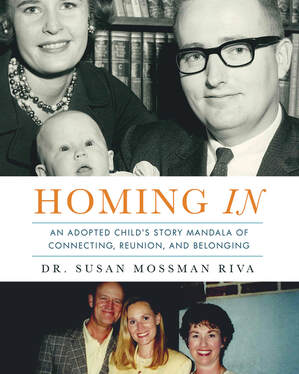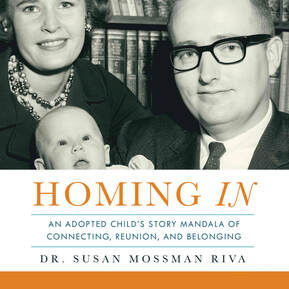Homing In: An Adopted Child's Story Mandala of Connecting, Reunion and Belonging
Available now in Audio:
|
|
Homing In: An Adopted Child's Story Mandala of Connecting, Reunion and Belonging tells how divine timing brought two adopted sisters back to their birth family. It is a true story about lines of inheritance, heartstrings of love, and becoming a pathfinder.
Dr. Susan Kay Mossman Riva tells the story of how she found her birth family and discovered that she was the oldest of five children. Her own search for her birth parents coincided with her birth sister’s search for their parents. Both sisters had been adopted in the early 1960’s. They were united with their birth family before their maternal grandmother died of cancer. Miraculously, their heartstrings were sensitive to their grandmother’s wish to find them before she passed away.
This extraordinary autobiography interweaves the relationship between lineage and inheritance. Dr. Riva addresses what we receive, what we keep, and what we decide to pass on to our own descendents. Her experience underscores the difficulty an adopted child has to balance their rightful place in both their adopted family and their birth family. The intercultural dimension is an intricate part of her narrative as Dr. Riva grew up in Nebraska and has raised her own five children in the Swiss Alps, after marrying her husband, a Swiss national.
The Golden Pocket Watch is a transitional object that allowed the creation of a unique line of inheritance based on merit. She received her grandfather’s heirloom watch as a gift from his “mentored son”. Dr. Riva develops the symbolic representation of the pocket watch presenting the importance of “divine timing” in our lives and how she came to understand that she had always been “watched over”.
Dr. Riva’s training as a social psychologist and medical anthropologist allows her to tell her own life story; describing her healing process and showing how inherited family patterns might be transformed. Referring to the Egyptian hieroglyphs, she explains how our hearts must be as light as a feather at the moment of death to pass over into the afterlife. She compares the Egyptian funeral ritual with our current challenge to lighten our eco-footprints, as we become stewards of Gaia, passing on a tradition of sustainable development. She also ties in epigenetic theory making correlations illustrating how environment and perception influence how our DNA is expressed in our descendents and ourselves.
This autoethnographic work shares Dr. Riva’s experience as an adopted child who found her birth family. The original letters add voice to her story. The poems and creative writing pieces from her past show the social construction of an adopted child’s identity throughout a lifetime using artful language. Women’s sexuality, the challenge women face balancing motherhood and careers, and the complexity of international relations as well as dual nationality are all social themes woven into the fabric of her book. She hopes that her own search will inspire healing conversations in other families, especially those concerned by adoption. Her personal quest allowed her to embark upon a transformative path, facilitating self-discovery and leading her back to her birth family. Her story re-collects her past, describing the many synchronicities that occurred. Her life trajectory is transformed as she liberates herself with the knowledge of her origins. Writing to transform her relations, she illustrates an emancipatory process. She like her sister became a pathfinder by following the signs, homing in to their birth family.
Dr. Susan Kay Mossman Riva tells the story of how she found her birth family and discovered that she was the oldest of five children. Her own search for her birth parents coincided with her birth sister’s search for their parents. Both sisters had been adopted in the early 1960’s. They were united with their birth family before their maternal grandmother died of cancer. Miraculously, their heartstrings were sensitive to their grandmother’s wish to find them before she passed away.
This extraordinary autobiography interweaves the relationship between lineage and inheritance. Dr. Riva addresses what we receive, what we keep, and what we decide to pass on to our own descendents. Her experience underscores the difficulty an adopted child has to balance their rightful place in both their adopted family and their birth family. The intercultural dimension is an intricate part of her narrative as Dr. Riva grew up in Nebraska and has raised her own five children in the Swiss Alps, after marrying her husband, a Swiss national.
The Golden Pocket Watch is a transitional object that allowed the creation of a unique line of inheritance based on merit. She received her grandfather’s heirloom watch as a gift from his “mentored son”. Dr. Riva develops the symbolic representation of the pocket watch presenting the importance of “divine timing” in our lives and how she came to understand that she had always been “watched over”.
Dr. Riva’s training as a social psychologist and medical anthropologist allows her to tell her own life story; describing her healing process and showing how inherited family patterns might be transformed. Referring to the Egyptian hieroglyphs, she explains how our hearts must be as light as a feather at the moment of death to pass over into the afterlife. She compares the Egyptian funeral ritual with our current challenge to lighten our eco-footprints, as we become stewards of Gaia, passing on a tradition of sustainable development. She also ties in epigenetic theory making correlations illustrating how environment and perception influence how our DNA is expressed in our descendents and ourselves.
This autoethnographic work shares Dr. Riva’s experience as an adopted child who found her birth family. The original letters add voice to her story. The poems and creative writing pieces from her past show the social construction of an adopted child’s identity throughout a lifetime using artful language. Women’s sexuality, the challenge women face balancing motherhood and careers, and the complexity of international relations as well as dual nationality are all social themes woven into the fabric of her book. She hopes that her own search will inspire healing conversations in other families, especially those concerned by adoption. Her personal quest allowed her to embark upon a transformative path, facilitating self-discovery and leading her back to her birth family. Her story re-collects her past, describing the many synchronicities that occurred. Her life trajectory is transformed as she liberates herself with the knowledge of her origins. Writing to transform her relations, she illustrates an emancipatory process. She like her sister became a pathfinder by following the signs, homing in to their birth family.
Website designed by Signed Books and Stuff






